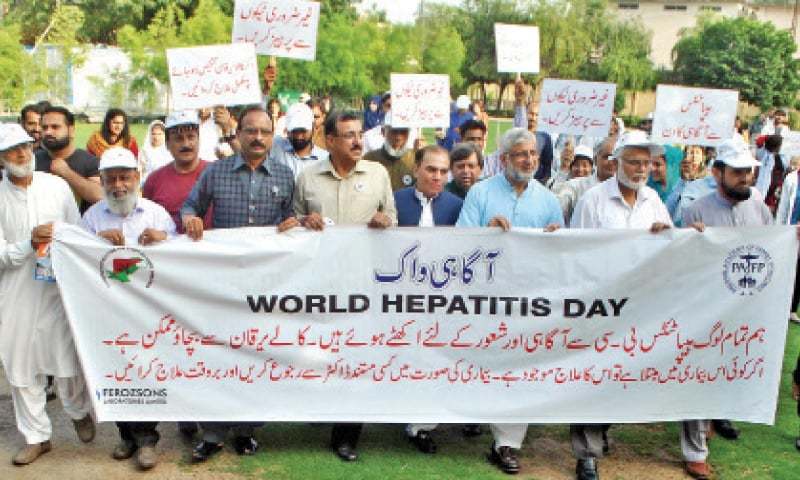By: Zara Amoon
World Hepatitis Day, observed annually on July 28th, is a global health event aimed at raising awareness about viral hepatitis, a disease causing liver inflammation and leading to severe liver disease and cancer. This day is particularly crucial for countries like Pakistan, where hepatitis is a significant public health challenge. Pakistan ranks among the nations with the highest prevalence of hepatitis, with approximately 10 million people infected with hepatitis B and C, according to the World Health Organization (WHO). This high prevalence strains the healthcare system and economy.
Hepatitis B and C are the most common forms of the disease in Pakistan, transmitted primarily through contact with infected blood and bodily fluids. Common transmission routes include unsafe medical practices such as syringe reuse, unscreened blood transfusions, and inadequate sterilization of medical and dental equipment. Public awareness about transmission and prevention is lacking, exacerbating the issue.
Several challenges impede efforts to combat hepatitis in Pakistan. The healthcare infrastructure suffers from a shortage of professionals, inadequate facilities, and insufficient funding, hindering the effective implementation of prevention and control programs. Public awareness about hepatitis is low, leading to delayed diagnosis and treatment. Stigma and discrimination associated with hepatitis further deter individuals from seeking testing and treatment. Despite the inclusion of hepatitis B vaccination in the national immunization program, coverage remains suboptimal, and access to antiviral treatment is limited, especially in rural and underserved areas.
The Pakistani government has recognized the urgency of addressing the hepatitis epidemic and has initiated several measures. The National Hepatitis Strategic Framework guides prevention and control efforts, focusing on raising awareness, improving vaccination coverage, enhancing screening and diagnostic services, and ensuring access to treatment. The National Hepatitis Control Program adopts a multi-faceted approach, expanding vaccination programs, promoting safe medical practices, increasing public awareness, and providing treatment and care for those affected. Public-private partnerships with NGOs, international organizations, and the private sector bolster these efforts, mobilizing resources and enhancing capacity building.
NGOs play a critical role in complementing government initiatives. Organizations like the Pakistan Society for the Study of Liver Diseases (PSSLD) and the Pakistan Liver Foundation (PLF) actively raise awareness, provide screening and diagnostic services, and advocate for better access to treatment. At the grassroots level, NGOs engage communities through awareness campaigns, community-based screening programs, and education on safe medical practices and the importance of vaccination. They also advocate for supportive policies and increased funding for hepatitis programs.
World Hepatitis Day in Pakistan features various activities to highlight the hepatitis epidemic and mobilize action. Public awareness campaigns educate the public about hepatitis through television, radio, social media, and print media, aiming to encourage testing and vaccination. Free screening and vaccination camps are set up, providing opportunities for testing, counseling, and vaccination. Seminars and workshops bring together healthcare professionals, policymakers, researchers, and community leaders to discuss best practices and strengthen the hepatitis response.
To achieve hepatitis elimination, Pakistan must continue to invest in healthcare infrastructure, increase public awareness, expand access to vaccination and treatment, promote safe medical practices, and engage communities. Collaborative efforts between the government, NGOs, healthcare professionals, and communities are essential for making significant strides towards eliminating hepatitis and ensuring a healthier future for all Pakistanis.


